Leadership and Management Roles in TESCO: A Detailed Analysis
VerifiedAdded on 2023/01/13
|15
|4329
|57
Report
AI Summary
This report provides a comprehensive analysis of leadership and management roles within TESCO, a leading British multinational grocery company. It begins by defining the roles and characteristics of leaders and managers, contrasting their responsibilities and styles. The report then explores how these roles function in different situational contexts, such as rapid change and ineffective communication. Furthermore, it examines various leadership theories and models, including system leadership and situational leadership, and their application within TESCO. The report also highlights key approaches to operations management, such as TQM, and discusses the importance of operations management in achieving business objectives. Finally, it considers the factors within the business environment that affect decision-making by leaders and managers. The report aims to provide insights into effective leadership and management practices within a dynamic business environment, using TESCO as a case study.
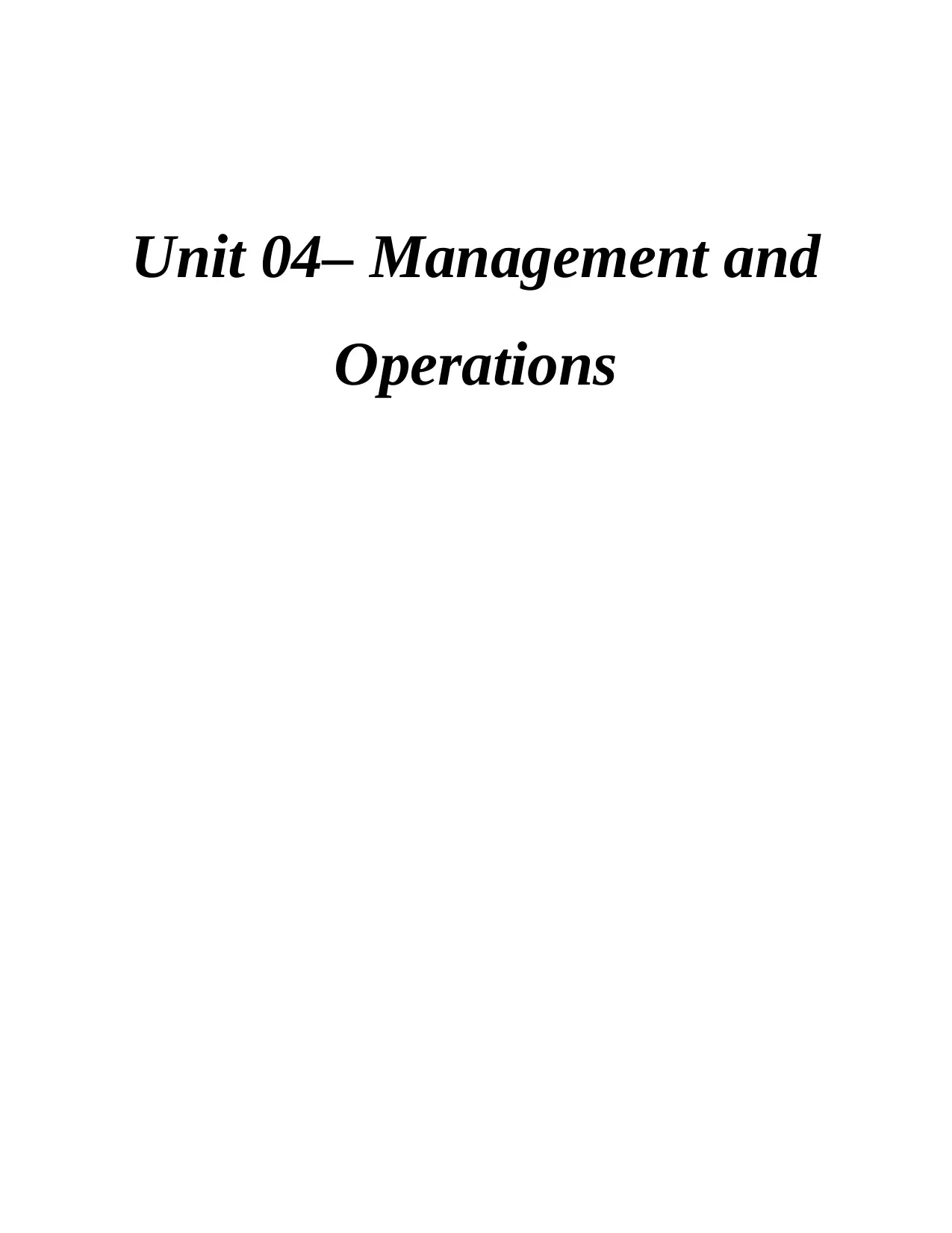
Unit 04– Management and
Operations
Operations
Paraphrase This Document
Need a fresh take? Get an instant paraphrase of this document with our AI Paraphraser
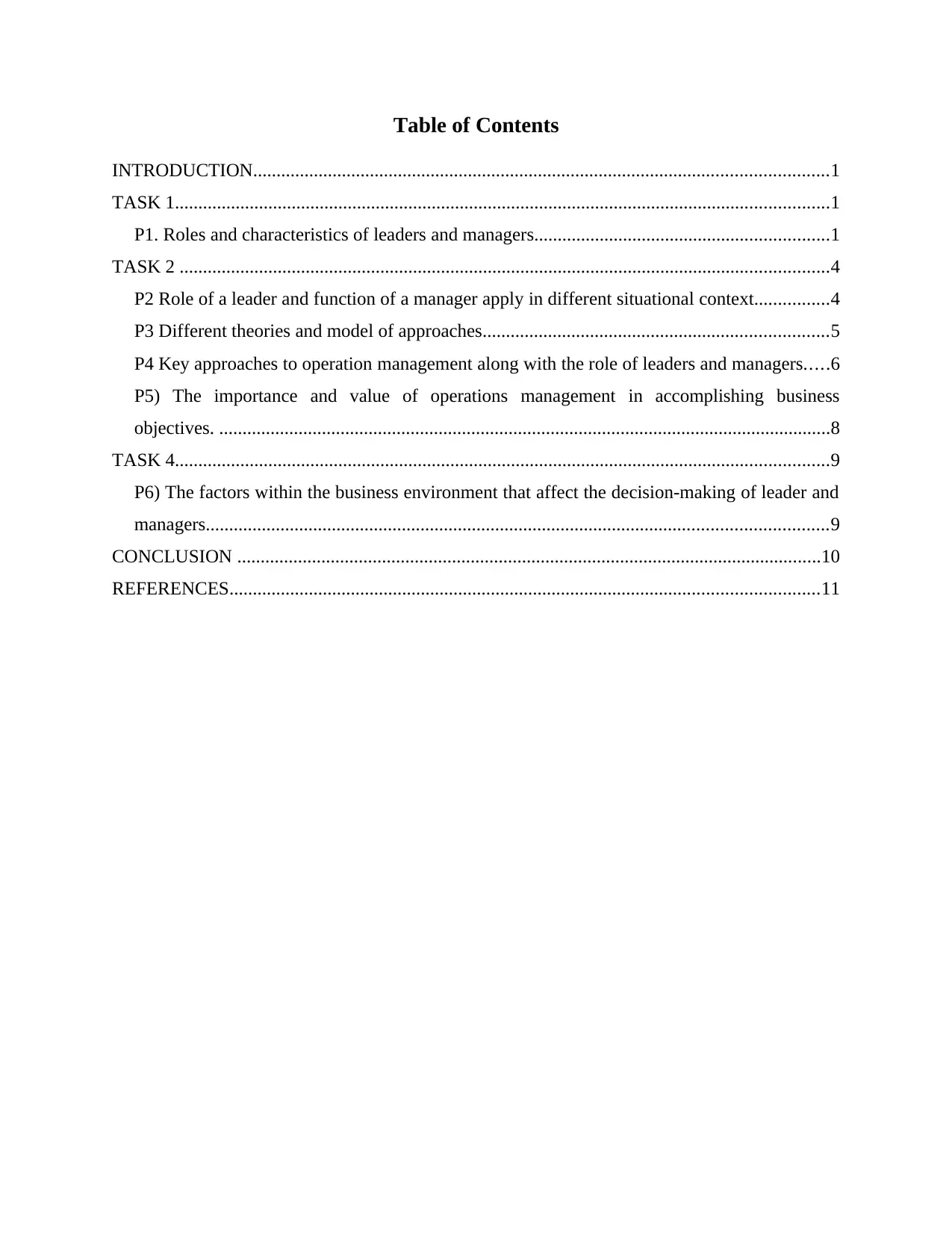
Table of Contents
INTRODUCTION...........................................................................................................................1
TASK 1............................................................................................................................................1
P1. Roles and characteristics of leaders and managers...............................................................1
TASK 2 ...........................................................................................................................................4
P2 Role of a leader and function of a manager apply in different situational context................4
P3 Different theories and model of approaches..........................................................................5
P4 Key approaches to operation management along with the role of leaders and managers.....6
P5) The importance and value of operations management in accomplishing business
objectives. ...................................................................................................................................8
TASK 4............................................................................................................................................9
P6) The factors within the business environment that affect the decision-making of leader and
managers.....................................................................................................................................9
CONCLUSION .............................................................................................................................10
REFERENCES..............................................................................................................................11
INTRODUCTION...........................................................................................................................1
TASK 1............................................................................................................................................1
P1. Roles and characteristics of leaders and managers...............................................................1
TASK 2 ...........................................................................................................................................4
P2 Role of a leader and function of a manager apply in different situational context................4
P3 Different theories and model of approaches..........................................................................5
P4 Key approaches to operation management along with the role of leaders and managers.....6
P5) The importance and value of operations management in accomplishing business
objectives. ...................................................................................................................................8
TASK 4............................................................................................................................................9
P6) The factors within the business environment that affect the decision-making of leader and
managers.....................................................................................................................................9
CONCLUSION .............................................................................................................................10
REFERENCES..............................................................................................................................11

⊘ This is a preview!⊘
Do you want full access?
Subscribe today to unlock all pages.

Trusted by 1+ million students worldwide
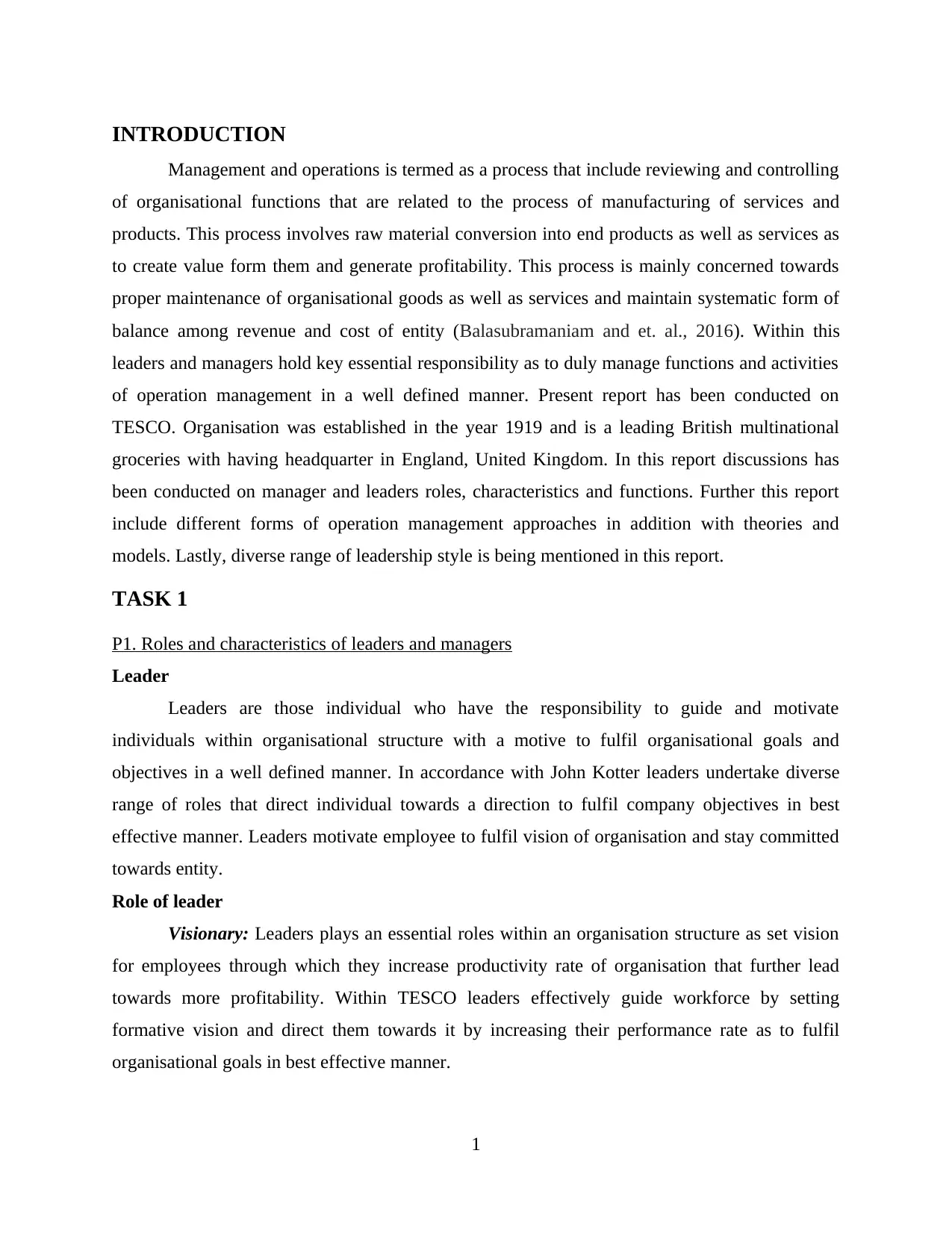
INTRODUCTION
Management and operations is termed as a process that include reviewing and controlling
of organisational functions that are related to the process of manufacturing of services and
products. This process involves raw material conversion into end products as well as services as
to create value form them and generate profitability. This process is mainly concerned towards
proper maintenance of organisational goods as well as services and maintain systematic form of
balance among revenue and cost of entity (Balasubramaniam and et. al., 2016). Within this
leaders and managers hold key essential responsibility as to duly manage functions and activities
of operation management in a well defined manner. Present report has been conducted on
TESCO. Organisation was established in the year 1919 and is a leading British multinational
groceries with having headquarter in England, United Kingdom. In this report discussions has
been conducted on manager and leaders roles, characteristics and functions. Further this report
include different forms of operation management approaches in addition with theories and
models. Lastly, diverse range of leadership style is being mentioned in this report.
TASK 1
P1. Roles and characteristics of leaders and managers
Leader
Leaders are those individual who have the responsibility to guide and motivate
individuals within organisational structure with a motive to fulfil organisational goals and
objectives in a well defined manner. In accordance with John Kotter leaders undertake diverse
range of roles that direct individual towards a direction to fulfil company objectives in best
effective manner. Leaders motivate employee to fulfil vision of organisation and stay committed
towards entity.
Role of leader
Visionary: Leaders plays an essential roles within an organisation structure as set vision
for employees through which they increase productivity rate of organisation that further lead
towards more profitability. Within TESCO leaders effectively guide workforce by setting
formative vision and direct them towards it by increasing their performance rate as to fulfil
organisational goals in best effective manner.
1
Management and operations is termed as a process that include reviewing and controlling
of organisational functions that are related to the process of manufacturing of services and
products. This process involves raw material conversion into end products as well as services as
to create value form them and generate profitability. This process is mainly concerned towards
proper maintenance of organisational goods as well as services and maintain systematic form of
balance among revenue and cost of entity (Balasubramaniam and et. al., 2016). Within this
leaders and managers hold key essential responsibility as to duly manage functions and activities
of operation management in a well defined manner. Present report has been conducted on
TESCO. Organisation was established in the year 1919 and is a leading British multinational
groceries with having headquarter in England, United Kingdom. In this report discussions has
been conducted on manager and leaders roles, characteristics and functions. Further this report
include different forms of operation management approaches in addition with theories and
models. Lastly, diverse range of leadership style is being mentioned in this report.
TASK 1
P1. Roles and characteristics of leaders and managers
Leader
Leaders are those individual who have the responsibility to guide and motivate
individuals within organisational structure with a motive to fulfil organisational goals and
objectives in a well defined manner. In accordance with John Kotter leaders undertake diverse
range of roles that direct individual towards a direction to fulfil company objectives in best
effective manner. Leaders motivate employee to fulfil vision of organisation and stay committed
towards entity.
Role of leader
Visionary: Leaders plays an essential roles within an organisation structure as set vision
for employees through which they increase productivity rate of organisation that further lead
towards more profitability. Within TESCO leaders effectively guide workforce by setting
formative vision and direct them towards it by increasing their performance rate as to fulfil
organisational goals in best effective manner.
1
Paraphrase This Document
Need a fresh take? Get an instant paraphrase of this document with our AI Paraphraser
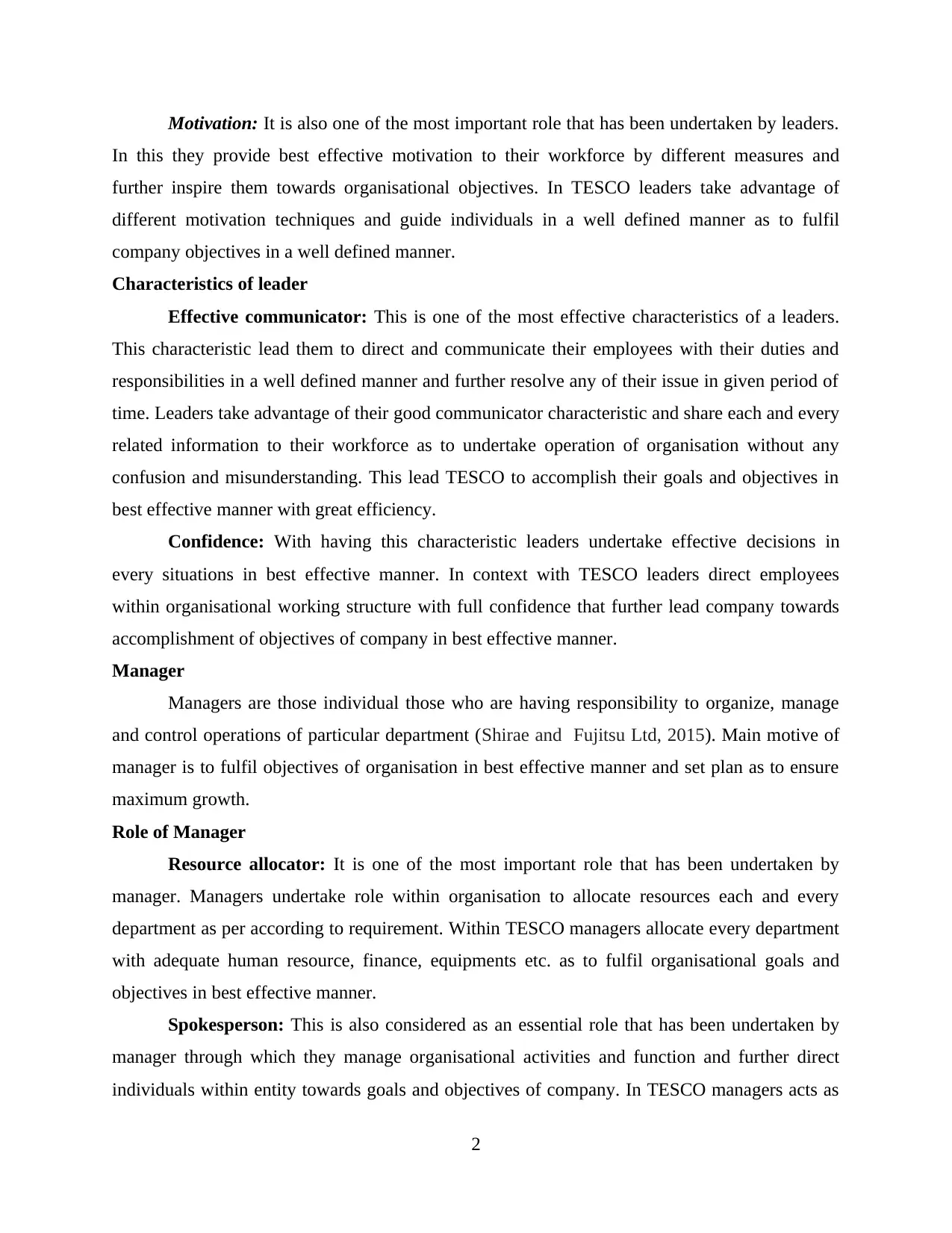
Motivation: It is also one of the most important role that has been undertaken by leaders.
In this they provide best effective motivation to their workforce by different measures and
further inspire them towards organisational objectives. In TESCO leaders take advantage of
different motivation techniques and guide individuals in a well defined manner as to fulfil
company objectives in a well defined manner.
Characteristics of leader
Effective communicator: This is one of the most effective characteristics of a leaders.
This characteristic lead them to direct and communicate their employees with their duties and
responsibilities in a well defined manner and further resolve any of their issue in given period of
time. Leaders take advantage of their good communicator characteristic and share each and every
related information to their workforce as to undertake operation of organisation without any
confusion and misunderstanding. This lead TESCO to accomplish their goals and objectives in
best effective manner with great efficiency.
Confidence: With having this characteristic leaders undertake effective decisions in
every situations in best effective manner. In context with TESCO leaders direct employees
within organisational working structure with full confidence that further lead company towards
accomplishment of objectives of company in best effective manner.
Manager
Managers are those individual those who are having responsibility to organize, manage
and control operations of particular department (Shirae and Fujitsu Ltd, 2015). Main motive of
manager is to fulfil objectives of organisation in best effective manner and set plan as to ensure
maximum growth.
Role of Manager
Resource allocator: It is one of the most important role that has been undertaken by
manager. Managers undertake role within organisation to allocate resources each and every
department as per according to requirement. Within TESCO managers allocate every department
with adequate human resource, finance, equipments etc. as to fulfil organisational goals and
objectives in best effective manner.
Spokesperson: This is also considered as an essential role that has been undertaken by
manager through which they manage organisational activities and function and further direct
individuals within entity towards goals and objectives of company. In TESCO managers acts as
2
In this they provide best effective motivation to their workforce by different measures and
further inspire them towards organisational objectives. In TESCO leaders take advantage of
different motivation techniques and guide individuals in a well defined manner as to fulfil
company objectives in a well defined manner.
Characteristics of leader
Effective communicator: This is one of the most effective characteristics of a leaders.
This characteristic lead them to direct and communicate their employees with their duties and
responsibilities in a well defined manner and further resolve any of their issue in given period of
time. Leaders take advantage of their good communicator characteristic and share each and every
related information to their workforce as to undertake operation of organisation without any
confusion and misunderstanding. This lead TESCO to accomplish their goals and objectives in
best effective manner with great efficiency.
Confidence: With having this characteristic leaders undertake effective decisions in
every situations in best effective manner. In context with TESCO leaders direct employees
within organisational working structure with full confidence that further lead company towards
accomplishment of objectives of company in best effective manner.
Manager
Managers are those individual those who are having responsibility to organize, manage
and control operations of particular department (Shirae and Fujitsu Ltd, 2015). Main motive of
manager is to fulfil objectives of organisation in best effective manner and set plan as to ensure
maximum growth.
Role of Manager
Resource allocator: It is one of the most important role that has been undertaken by
manager. Managers undertake role within organisation to allocate resources each and every
department as per according to requirement. Within TESCO managers allocate every department
with adequate human resource, finance, equipments etc. as to fulfil organisational goals and
objectives in best effective manner.
Spokesperson: This is also considered as an essential role that has been undertaken by
manager through which they manage organisational activities and function and further direct
individuals within entity towards goals and objectives of company. In TESCO managers acts as
2
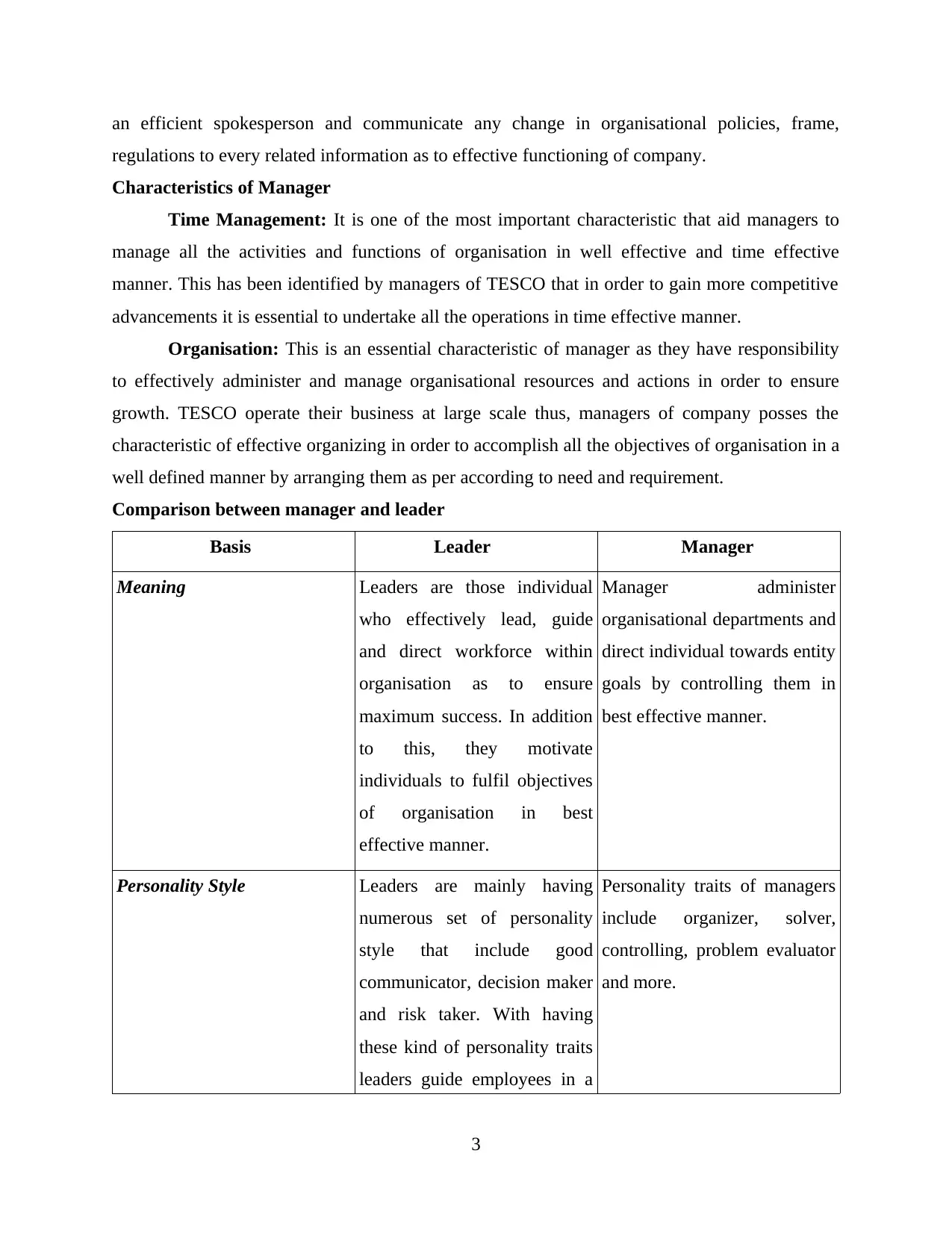
an efficient spokesperson and communicate any change in organisational policies, frame,
regulations to every related information as to effective functioning of company.
Characteristics of Manager
Time Management: It is one of the most important characteristic that aid managers to
manage all the activities and functions of organisation in well effective and time effective
manner. This has been identified by managers of TESCO that in order to gain more competitive
advancements it is essential to undertake all the operations in time effective manner.
Organisation: This is an essential characteristic of manager as they have responsibility
to effectively administer and manage organisational resources and actions in order to ensure
growth. TESCO operate their business at large scale thus, managers of company posses the
characteristic of effective organizing in order to accomplish all the objectives of organisation in a
well defined manner by arranging them as per according to need and requirement.
Comparison between manager and leader
Basis Leader Manager
Meaning Leaders are those individual
who effectively lead, guide
and direct workforce within
organisation as to ensure
maximum success. In addition
to this, they motivate
individuals to fulfil objectives
of organisation in best
effective manner.
Manager administer
organisational departments and
direct individual towards entity
goals by controlling them in
best effective manner.
Personality Style Leaders are mainly having
numerous set of personality
style that include good
communicator, decision maker
and risk taker. With having
these kind of personality traits
leaders guide employees in a
Personality traits of managers
include organizer, solver,
controlling, problem evaluator
and more.
3
regulations to every related information as to effective functioning of company.
Characteristics of Manager
Time Management: It is one of the most important characteristic that aid managers to
manage all the activities and functions of organisation in well effective and time effective
manner. This has been identified by managers of TESCO that in order to gain more competitive
advancements it is essential to undertake all the operations in time effective manner.
Organisation: This is an essential characteristic of manager as they have responsibility
to effectively administer and manage organisational resources and actions in order to ensure
growth. TESCO operate their business at large scale thus, managers of company posses the
characteristic of effective organizing in order to accomplish all the objectives of organisation in a
well defined manner by arranging them as per according to need and requirement.
Comparison between manager and leader
Basis Leader Manager
Meaning Leaders are those individual
who effectively lead, guide
and direct workforce within
organisation as to ensure
maximum success. In addition
to this, they motivate
individuals to fulfil objectives
of organisation in best
effective manner.
Manager administer
organisational departments and
direct individual towards entity
goals by controlling them in
best effective manner.
Personality Style Leaders are mainly having
numerous set of personality
style that include good
communicator, decision maker
and risk taker. With having
these kind of personality traits
leaders guide employees in a
Personality traits of managers
include organizer, solver,
controlling, problem evaluator
and more.
3
⊘ This is a preview!⊘
Do you want full access?
Subscribe today to unlock all pages.

Trusted by 1+ million students worldwide
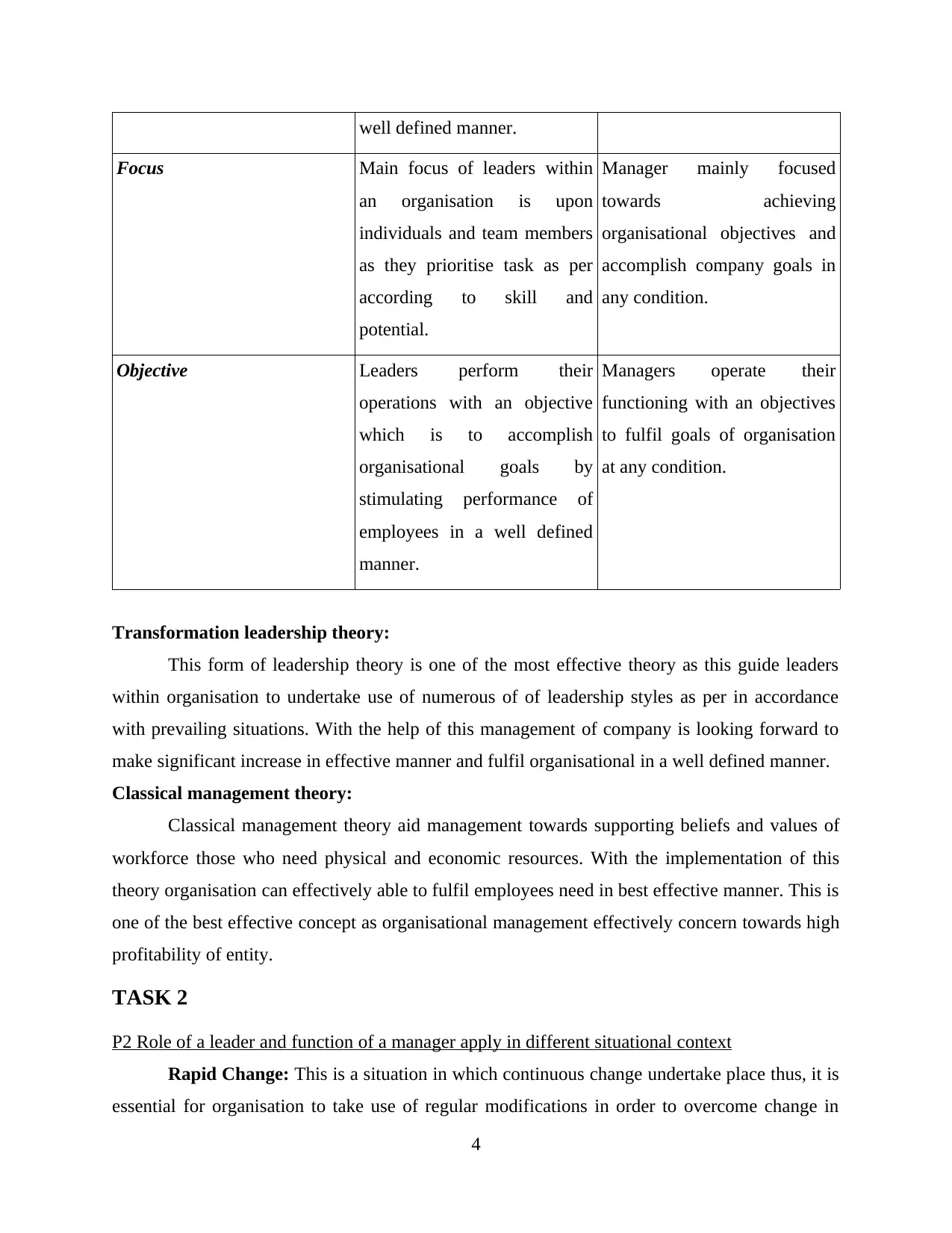
well defined manner.
Focus Main focus of leaders within
an organisation is upon
individuals and team members
as they prioritise task as per
according to skill and
potential.
Manager mainly focused
towards achieving
organisational objectives and
accomplish company goals in
any condition.
Objective Leaders perform their
operations with an objective
which is to accomplish
organisational goals by
stimulating performance of
employees in a well defined
manner.
Managers operate their
functioning with an objectives
to fulfil goals of organisation
at any condition.
Transformation leadership theory:
This form of leadership theory is one of the most effective theory as this guide leaders
within organisation to undertake use of numerous of of leadership styles as per in accordance
with prevailing situations. With the help of this management of company is looking forward to
make significant increase in effective manner and fulfil organisational in a well defined manner.
Classical management theory:
Classical management theory aid management towards supporting beliefs and values of
workforce those who need physical and economic resources. With the implementation of this
theory organisation can effectively able to fulfil employees need in best effective manner. This is
one of the best effective concept as organisational management effectively concern towards high
profitability of entity.
TASK 2
P2 Role of a leader and function of a manager apply in different situational context
Rapid Change: This is a situation in which continuous change undertake place thus, it is
essential for organisation to take use of regular modifications in order to overcome change in
4
Focus Main focus of leaders within
an organisation is upon
individuals and team members
as they prioritise task as per
according to skill and
potential.
Manager mainly focused
towards achieving
organisational objectives and
accomplish company goals in
any condition.
Objective Leaders perform their
operations with an objective
which is to accomplish
organisational goals by
stimulating performance of
employees in a well defined
manner.
Managers operate their
functioning with an objectives
to fulfil goals of organisation
at any condition.
Transformation leadership theory:
This form of leadership theory is one of the most effective theory as this guide leaders
within organisation to undertake use of numerous of of leadership styles as per in accordance
with prevailing situations. With the help of this management of company is looking forward to
make significant increase in effective manner and fulfil organisational in a well defined manner.
Classical management theory:
Classical management theory aid management towards supporting beliefs and values of
workforce those who need physical and economic resources. With the implementation of this
theory organisation can effectively able to fulfil employees need in best effective manner. This is
one of the best effective concept as organisational management effectively concern towards high
profitability of entity.
TASK 2
P2 Role of a leader and function of a manager apply in different situational context
Rapid Change: This is a situation in which continuous change undertake place thus, it is
essential for organisation to take use of regular modifications in order to overcome change in
4
Paraphrase This Document
Need a fresh take? Get an instant paraphrase of this document with our AI Paraphraser
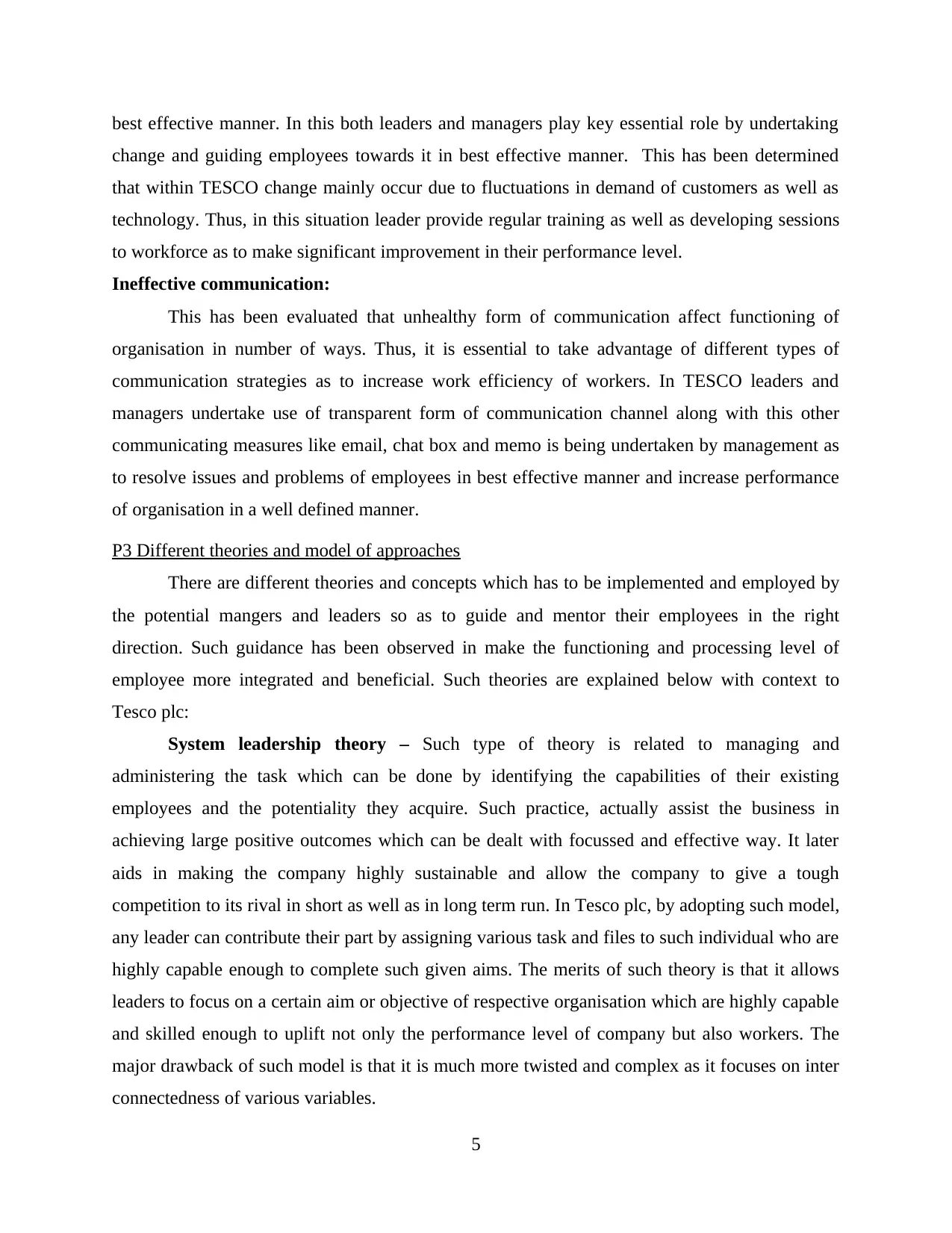
best effective manner. In this both leaders and managers play key essential role by undertaking
change and guiding employees towards it in best effective manner. This has been determined
that within TESCO change mainly occur due to fluctuations in demand of customers as well as
technology. Thus, in this situation leader provide regular training as well as developing sessions
to workforce as to make significant improvement in their performance level.
Ineffective communication:
This has been evaluated that unhealthy form of communication affect functioning of
organisation in number of ways. Thus, it is essential to take advantage of different types of
communication strategies as to increase work efficiency of workers. In TESCO leaders and
managers undertake use of transparent form of communication channel along with this other
communicating measures like email, chat box and memo is being undertaken by management as
to resolve issues and problems of employees in best effective manner and increase performance
of organisation in a well defined manner.
P3 Different theories and model of approaches
There are different theories and concepts which has to be implemented and employed by
the potential mangers and leaders so as to guide and mentor their employees in the right
direction. Such guidance has been observed in make the functioning and processing level of
employee more integrated and beneficial. Such theories are explained below with context to
Tesco plc:
System leadership theory – Such type of theory is related to managing and
administering the task which can be done by identifying the capabilities of their existing
employees and the potentiality they acquire. Such practice, actually assist the business in
achieving large positive outcomes which can be dealt with focussed and effective way. It later
aids in making the company highly sustainable and allow the company to give a tough
competition to its rival in short as well as in long term run. In Tesco plc, by adopting such model,
any leader can contribute their part by assigning various task and files to such individual who are
highly capable enough to complete such given aims. The merits of such theory is that it allows
leaders to focus on a certain aim or objective of respective organisation which are highly capable
and skilled enough to uplift not only the performance level of company but also workers. The
major drawback of such model is that it is much more twisted and complex as it focuses on inter
connectedness of various variables.
5
change and guiding employees towards it in best effective manner. This has been determined
that within TESCO change mainly occur due to fluctuations in demand of customers as well as
technology. Thus, in this situation leader provide regular training as well as developing sessions
to workforce as to make significant improvement in their performance level.
Ineffective communication:
This has been evaluated that unhealthy form of communication affect functioning of
organisation in number of ways. Thus, it is essential to take advantage of different types of
communication strategies as to increase work efficiency of workers. In TESCO leaders and
managers undertake use of transparent form of communication channel along with this other
communicating measures like email, chat box and memo is being undertaken by management as
to resolve issues and problems of employees in best effective manner and increase performance
of organisation in a well defined manner.
P3 Different theories and model of approaches
There are different theories and concepts which has to be implemented and employed by
the potential mangers and leaders so as to guide and mentor their employees in the right
direction. Such guidance has been observed in make the functioning and processing level of
employee more integrated and beneficial. Such theories are explained below with context to
Tesco plc:
System leadership theory – Such type of theory is related to managing and
administering the task which can be done by identifying the capabilities of their existing
employees and the potentiality they acquire. Such practice, actually assist the business in
achieving large positive outcomes which can be dealt with focussed and effective way. It later
aids in making the company highly sustainable and allow the company to give a tough
competition to its rival in short as well as in long term run. In Tesco plc, by adopting such model,
any leader can contribute their part by assigning various task and files to such individual who are
highly capable enough to complete such given aims. The merits of such theory is that it allows
leaders to focus on a certain aim or objective of respective organisation which are highly capable
and skilled enough to uplift not only the performance level of company but also workers. The
major drawback of such model is that it is much more twisted and complex as it focuses on inter
connectedness of various variables.
5
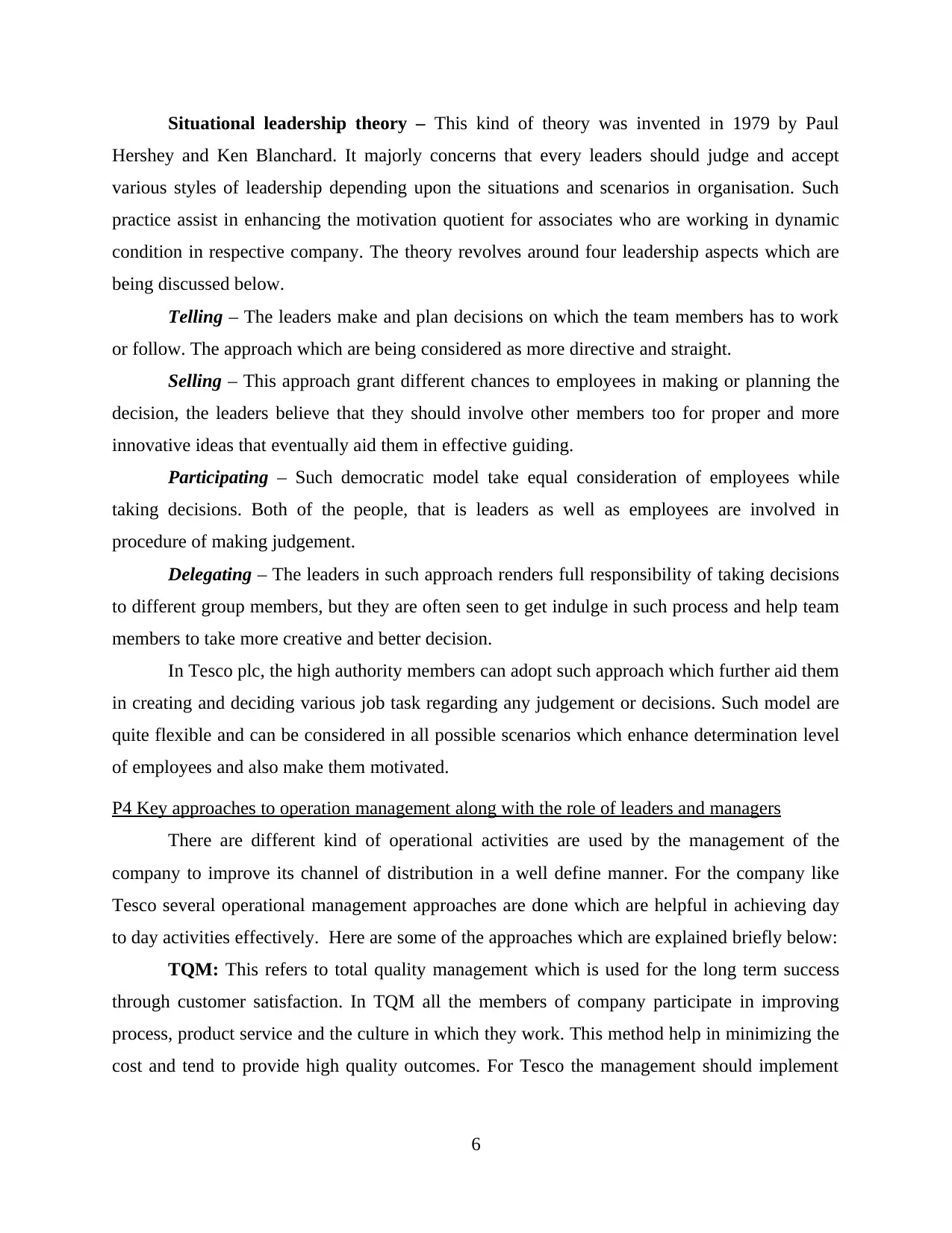
Situational leadership theory – This kind of theory was invented in 1979 by Paul
Hershey and Ken Blanchard. It majorly concerns that every leaders should judge and accept
various styles of leadership depending upon the situations and scenarios in organisation. Such
practice assist in enhancing the motivation quotient for associates who are working in dynamic
condition in respective company. The theory revolves around four leadership aspects which are
being discussed below.
Telling – The leaders make and plan decisions on which the team members has to work
or follow. The approach which are being considered as more directive and straight.
Selling – This approach grant different chances to employees in making or planning the
decision, the leaders believe that they should involve other members too for proper and more
innovative ideas that eventually aid them in effective guiding.
Participating – Such democratic model take equal consideration of employees while
taking decisions. Both of the people, that is leaders as well as employees are involved in
procedure of making judgement.
Delegating – The leaders in such approach renders full responsibility of taking decisions
to different group members, but they are often seen to get indulge in such process and help team
members to take more creative and better decision.
In Tesco plc, the high authority members can adopt such approach which further aid them
in creating and deciding various job task regarding any judgement or decisions. Such model are
quite flexible and can be considered in all possible scenarios which enhance determination level
of employees and also make them motivated.
P4 Key approaches to operation management along with the role of leaders and managers
There are different kind of operational activities are used by the management of the
company to improve its channel of distribution in a well define manner. For the company like
Tesco several operational management approaches are done which are helpful in achieving day
to day activities effectively. Here are some of the approaches which are explained briefly below:
TQM: This refers to total quality management which is used for the long term success
through customer satisfaction. In TQM all the members of company participate in improving
process, product service and the culture in which they work. This method help in minimizing the
cost and tend to provide high quality outcomes. For Tesco the management should implement
6
Hershey and Ken Blanchard. It majorly concerns that every leaders should judge and accept
various styles of leadership depending upon the situations and scenarios in organisation. Such
practice assist in enhancing the motivation quotient for associates who are working in dynamic
condition in respective company. The theory revolves around four leadership aspects which are
being discussed below.
Telling – The leaders make and plan decisions on which the team members has to work
or follow. The approach which are being considered as more directive and straight.
Selling – This approach grant different chances to employees in making or planning the
decision, the leaders believe that they should involve other members too for proper and more
innovative ideas that eventually aid them in effective guiding.
Participating – Such democratic model take equal consideration of employees while
taking decisions. Both of the people, that is leaders as well as employees are involved in
procedure of making judgement.
Delegating – The leaders in such approach renders full responsibility of taking decisions
to different group members, but they are often seen to get indulge in such process and help team
members to take more creative and better decision.
In Tesco plc, the high authority members can adopt such approach which further aid them
in creating and deciding various job task regarding any judgement or decisions. Such model are
quite flexible and can be considered in all possible scenarios which enhance determination level
of employees and also make them motivated.
P4 Key approaches to operation management along with the role of leaders and managers
There are different kind of operational activities are used by the management of the
company to improve its channel of distribution in a well define manner. For the company like
Tesco several operational management approaches are done which are helpful in achieving day
to day activities effectively. Here are some of the approaches which are explained briefly below:
TQM: This refers to total quality management which is used for the long term success
through customer satisfaction. In TQM all the members of company participate in improving
process, product service and the culture in which they work. This method help in minimizing the
cost and tend to provide high quality outcomes. For Tesco the management should implement
6
⊘ This is a preview!⊘
Do you want full access?
Subscribe today to unlock all pages.

Trusted by 1+ million students worldwide
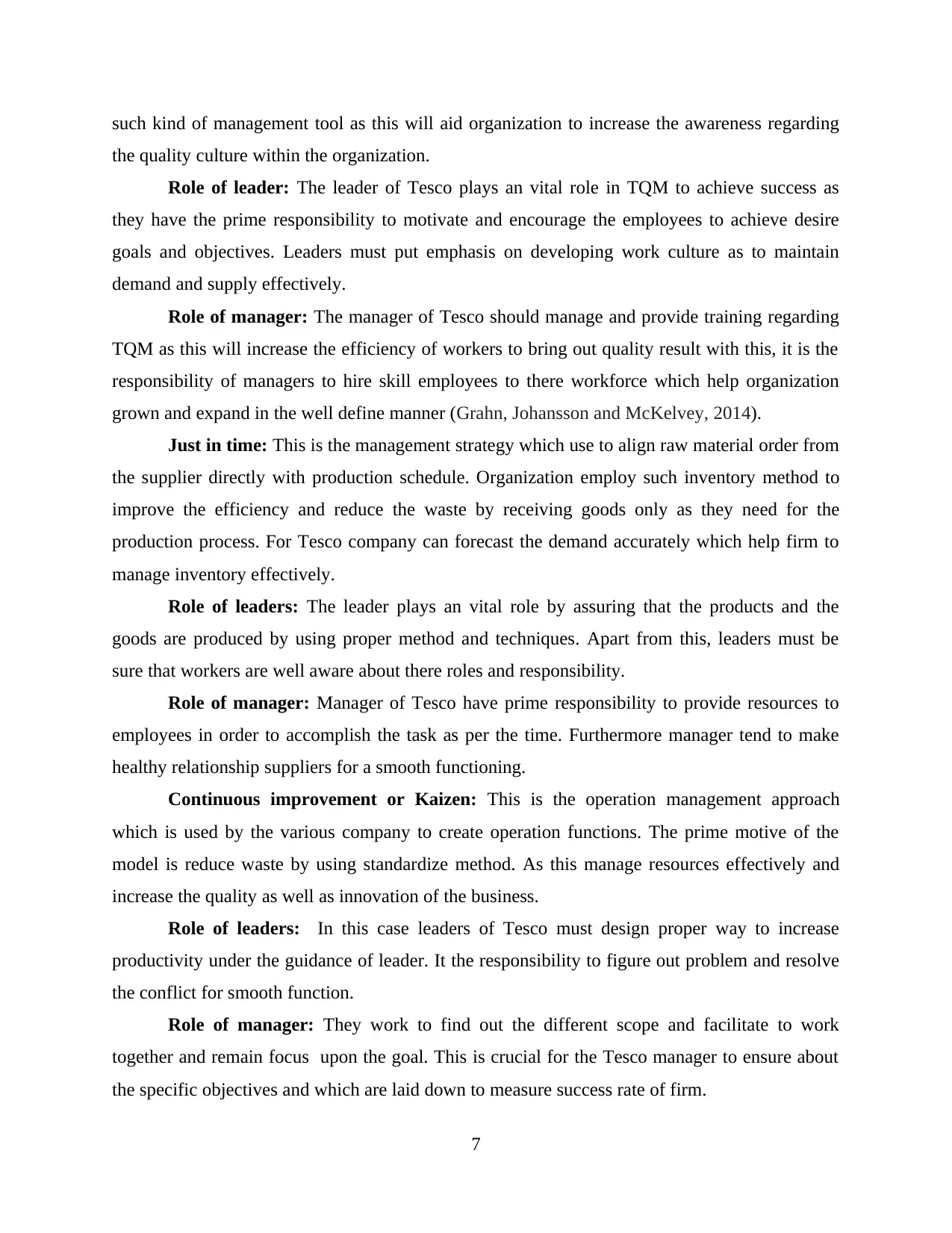
such kind of management tool as this will aid organization to increase the awareness regarding
the quality culture within the organization.
Role of leader: The leader of Tesco plays an vital role in TQM to achieve success as
they have the prime responsibility to motivate and encourage the employees to achieve desire
goals and objectives. Leaders must put emphasis on developing work culture as to maintain
demand and supply effectively.
Role of manager: The manager of Tesco should manage and provide training regarding
TQM as this will increase the efficiency of workers to bring out quality result with this, it is the
responsibility of managers to hire skill employees to there workforce which help organization
grown and expand in the well define manner (Grahn, Johansson and McKelvey, 2014).
Just in time: This is the management strategy which use to align raw material order from
the supplier directly with production schedule. Organization employ such inventory method to
improve the efficiency and reduce the waste by receiving goods only as they need for the
production process. For Tesco company can forecast the demand accurately which help firm to
manage inventory effectively.
Role of leaders: The leader plays an vital role by assuring that the products and the
goods are produced by using proper method and techniques. Apart from this, leaders must be
sure that workers are well aware about there roles and responsibility.
Role of manager: Manager of Tesco have prime responsibility to provide resources to
employees in order to accomplish the task as per the time. Furthermore manager tend to make
healthy relationship suppliers for a smooth functioning.
Continuous improvement or Kaizen: This is the operation management approach
which is used by the various company to create operation functions. The prime motive of the
model is reduce waste by using standardize method. As this manage resources effectively and
increase the quality as well as innovation of the business.
Role of leaders: In this case leaders of Tesco must design proper way to increase
productivity under the guidance of leader. It the responsibility to figure out problem and resolve
the conflict for smooth function.
Role of manager: They work to find out the different scope and facilitate to work
together and remain focus upon the goal. This is crucial for the Tesco manager to ensure about
the specific objectives and which are laid down to measure success rate of firm.
7
the quality culture within the organization.
Role of leader: The leader of Tesco plays an vital role in TQM to achieve success as
they have the prime responsibility to motivate and encourage the employees to achieve desire
goals and objectives. Leaders must put emphasis on developing work culture as to maintain
demand and supply effectively.
Role of manager: The manager of Tesco should manage and provide training regarding
TQM as this will increase the efficiency of workers to bring out quality result with this, it is the
responsibility of managers to hire skill employees to there workforce which help organization
grown and expand in the well define manner (Grahn, Johansson and McKelvey, 2014).
Just in time: This is the management strategy which use to align raw material order from
the supplier directly with production schedule. Organization employ such inventory method to
improve the efficiency and reduce the waste by receiving goods only as they need for the
production process. For Tesco company can forecast the demand accurately which help firm to
manage inventory effectively.
Role of leaders: The leader plays an vital role by assuring that the products and the
goods are produced by using proper method and techniques. Apart from this, leaders must be
sure that workers are well aware about there roles and responsibility.
Role of manager: Manager of Tesco have prime responsibility to provide resources to
employees in order to accomplish the task as per the time. Furthermore manager tend to make
healthy relationship suppliers for a smooth functioning.
Continuous improvement or Kaizen: This is the operation management approach
which is used by the various company to create operation functions. The prime motive of the
model is reduce waste by using standardize method. As this manage resources effectively and
increase the quality as well as innovation of the business.
Role of leaders: In this case leaders of Tesco must design proper way to increase
productivity under the guidance of leader. It the responsibility to figure out problem and resolve
the conflict for smooth function.
Role of manager: They work to find out the different scope and facilitate to work
together and remain focus upon the goal. This is crucial for the Tesco manager to ensure about
the specific objectives and which are laid down to measure success rate of firm.
7
Paraphrase This Document
Need a fresh take? Get an instant paraphrase of this document with our AI Paraphraser
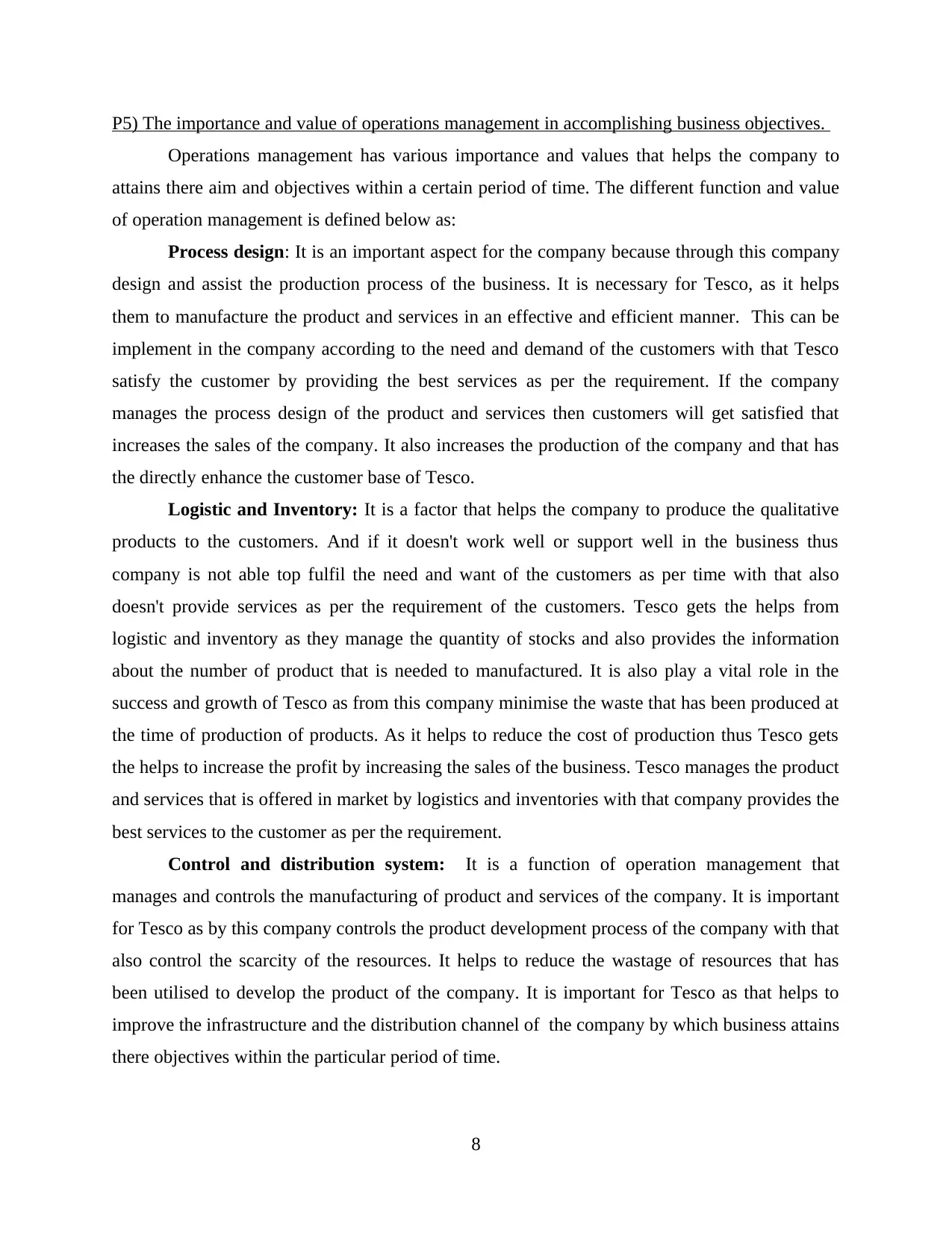
P5) The importance and value of operations management in accomplishing business objectives.
Operations management has various importance and values that helps the company to
attains there aim and objectives within a certain period of time. The different function and value
of operation management is defined below as:
Process design: It is an important aspect for the company because through this company
design and assist the production process of the business. It is necessary for Tesco, as it helps
them to manufacture the product and services in an effective and efficient manner. This can be
implement in the company according to the need and demand of the customers with that Tesco
satisfy the customer by providing the best services as per the requirement. If the company
manages the process design of the product and services then customers will get satisfied that
increases the sales of the company. It also increases the production of the company and that has
the directly enhance the customer base of Tesco.
Logistic and Inventory: It is a factor that helps the company to produce the qualitative
products to the customers. And if it doesn't work well or support well in the business thus
company is not able top fulfil the need and want of the customers as per time with that also
doesn't provide services as per the requirement of the customers. Tesco gets the helps from
logistic and inventory as they manage the quantity of stocks and also provides the information
about the number of product that is needed to manufactured. It is also play a vital role in the
success and growth of Tesco as from this company minimise the waste that has been produced at
the time of production of products. As it helps to reduce the cost of production thus Tesco gets
the helps to increase the profit by increasing the sales of the business. Tesco manages the product
and services that is offered in market by logistics and inventories with that company provides the
best services to the customer as per the requirement.
Control and distribution system: It is a function of operation management that
manages and controls the manufacturing of product and services of the company. It is important
for Tesco as by this company controls the product development process of the company with that
also control the scarcity of the resources. It helps to reduce the wastage of resources that has
been utilised to develop the product of the company. It is important for Tesco as that helps to
improve the infrastructure and the distribution channel of the company by which business attains
there objectives within the particular period of time.
8
Operations management has various importance and values that helps the company to
attains there aim and objectives within a certain period of time. The different function and value
of operation management is defined below as:
Process design: It is an important aspect for the company because through this company
design and assist the production process of the business. It is necessary for Tesco, as it helps
them to manufacture the product and services in an effective and efficient manner. This can be
implement in the company according to the need and demand of the customers with that Tesco
satisfy the customer by providing the best services as per the requirement. If the company
manages the process design of the product and services then customers will get satisfied that
increases the sales of the company. It also increases the production of the company and that has
the directly enhance the customer base of Tesco.
Logistic and Inventory: It is a factor that helps the company to produce the qualitative
products to the customers. And if it doesn't work well or support well in the business thus
company is not able top fulfil the need and want of the customers as per time with that also
doesn't provide services as per the requirement of the customers. Tesco gets the helps from
logistic and inventory as they manage the quantity of stocks and also provides the information
about the number of product that is needed to manufactured. It is also play a vital role in the
success and growth of Tesco as from this company minimise the waste that has been produced at
the time of production of products. As it helps to reduce the cost of production thus Tesco gets
the helps to increase the profit by increasing the sales of the business. Tesco manages the product
and services that is offered in market by logistics and inventories with that company provides the
best services to the customer as per the requirement.
Control and distribution system: It is a function of operation management that
manages and controls the manufacturing of product and services of the company. It is important
for Tesco as by this company controls the product development process of the company with that
also control the scarcity of the resources. It helps to reduce the wastage of resources that has
been utilised to develop the product of the company. It is important for Tesco as that helps to
improve the infrastructure and the distribution channel of the company by which business attains
there objectives within the particular period of time.
8
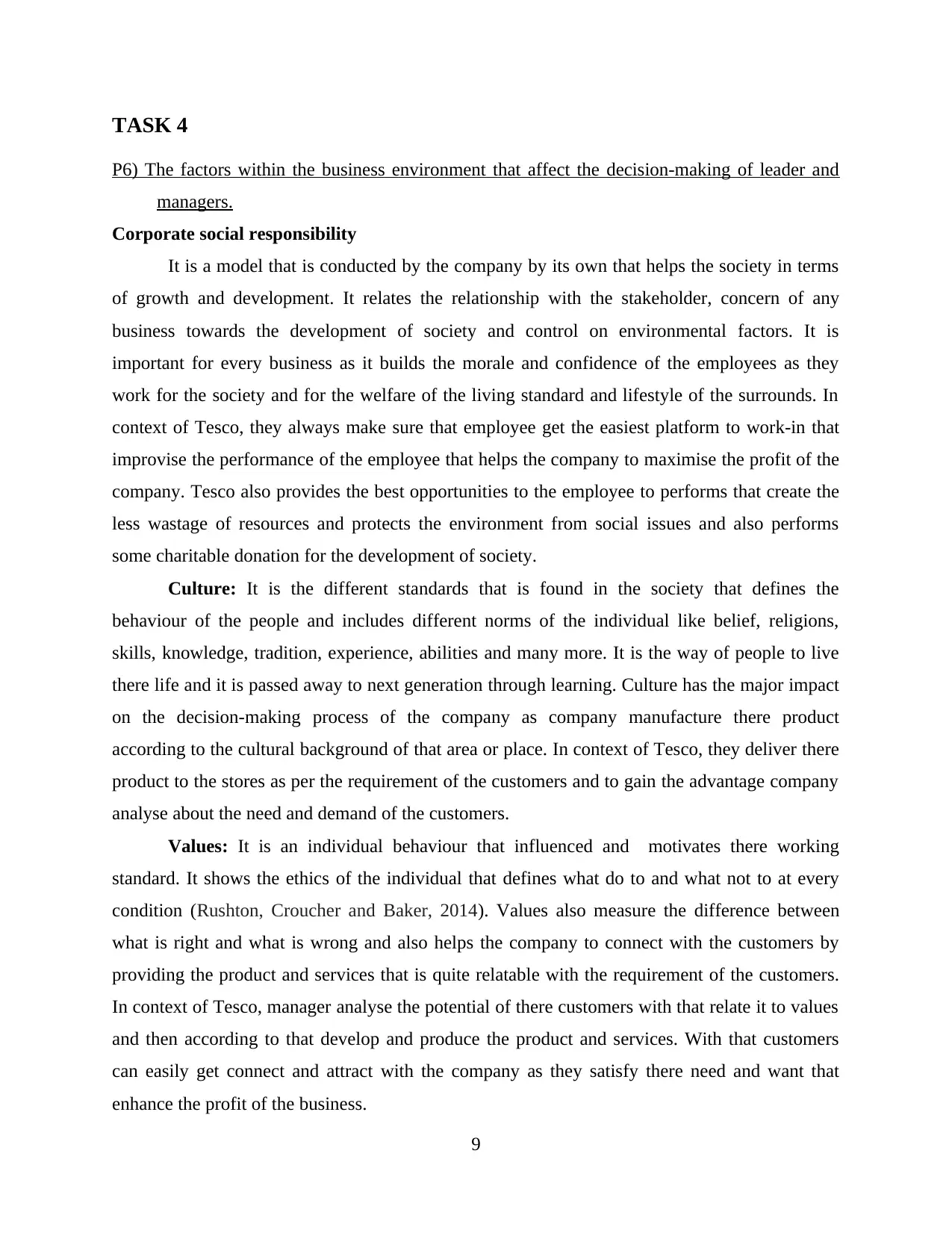
TASK 4
P6) The factors within the business environment that affect the decision-making of leader and
managers.
Corporate social responsibility
It is a model that is conducted by the company by its own that helps the society in terms
of growth and development. It relates the relationship with the stakeholder, concern of any
business towards the development of society and control on environmental factors. It is
important for every business as it builds the morale and confidence of the employees as they
work for the society and for the welfare of the living standard and lifestyle of the surrounds. In
context of Tesco, they always make sure that employee get the easiest platform to work-in that
improvise the performance of the employee that helps the company to maximise the profit of the
company. Tesco also provides the best opportunities to the employee to performs that create the
less wastage of resources and protects the environment from social issues and also performs
some charitable donation for the development of society.
Culture: It is the different standards that is found in the society that defines the
behaviour of the people and includes different norms of the individual like belief, religions,
skills, knowledge, tradition, experience, abilities and many more. It is the way of people to live
there life and it is passed away to next generation through learning. Culture has the major impact
on the decision-making process of the company as company manufacture there product
according to the cultural background of that area or place. In context of Tesco, they deliver there
product to the stores as per the requirement of the customers and to gain the advantage company
analyse about the need and demand of the customers.
Values: It is an individual behaviour that influenced and motivates there working
standard. It shows the ethics of the individual that defines what do to and what not to at every
condition (Rushton, Croucher and Baker, 2014). Values also measure the difference between
what is right and what is wrong and also helps the company to connect with the customers by
providing the product and services that is quite relatable with the requirement of the customers.
In context of Tesco, manager analyse the potential of there customers with that relate it to values
and then according to that develop and produce the product and services. With that customers
can easily get connect and attract with the company as they satisfy there need and want that
enhance the profit of the business.
9
P6) The factors within the business environment that affect the decision-making of leader and
managers.
Corporate social responsibility
It is a model that is conducted by the company by its own that helps the society in terms
of growth and development. It relates the relationship with the stakeholder, concern of any
business towards the development of society and control on environmental factors. It is
important for every business as it builds the morale and confidence of the employees as they
work for the society and for the welfare of the living standard and lifestyle of the surrounds. In
context of Tesco, they always make sure that employee get the easiest platform to work-in that
improvise the performance of the employee that helps the company to maximise the profit of the
company. Tesco also provides the best opportunities to the employee to performs that create the
less wastage of resources and protects the environment from social issues and also performs
some charitable donation for the development of society.
Culture: It is the different standards that is found in the society that defines the
behaviour of the people and includes different norms of the individual like belief, religions,
skills, knowledge, tradition, experience, abilities and many more. It is the way of people to live
there life and it is passed away to next generation through learning. Culture has the major impact
on the decision-making process of the company as company manufacture there product
according to the cultural background of that area or place. In context of Tesco, they deliver there
product to the stores as per the requirement of the customers and to gain the advantage company
analyse about the need and demand of the customers.
Values: It is an individual behaviour that influenced and motivates there working
standard. It shows the ethics of the individual that defines what do to and what not to at every
condition (Rushton, Croucher and Baker, 2014). Values also measure the difference between
what is right and what is wrong and also helps the company to connect with the customers by
providing the product and services that is quite relatable with the requirement of the customers.
In context of Tesco, manager analyse the potential of there customers with that relate it to values
and then according to that develop and produce the product and services. With that customers
can easily get connect and attract with the company as they satisfy there need and want that
enhance the profit of the business.
9
⊘ This is a preview!⊘
Do you want full access?
Subscribe today to unlock all pages.

Trusted by 1+ million students worldwide
1 out of 15
Related Documents
Your All-in-One AI-Powered Toolkit for Academic Success.
+13062052269
info@desklib.com
Available 24*7 on WhatsApp / Email
![[object Object]](/_next/static/media/star-bottom.7253800d.svg)
Unlock your academic potential
Copyright © 2020–2026 A2Z Services. All Rights Reserved. Developed and managed by ZUCOL.





